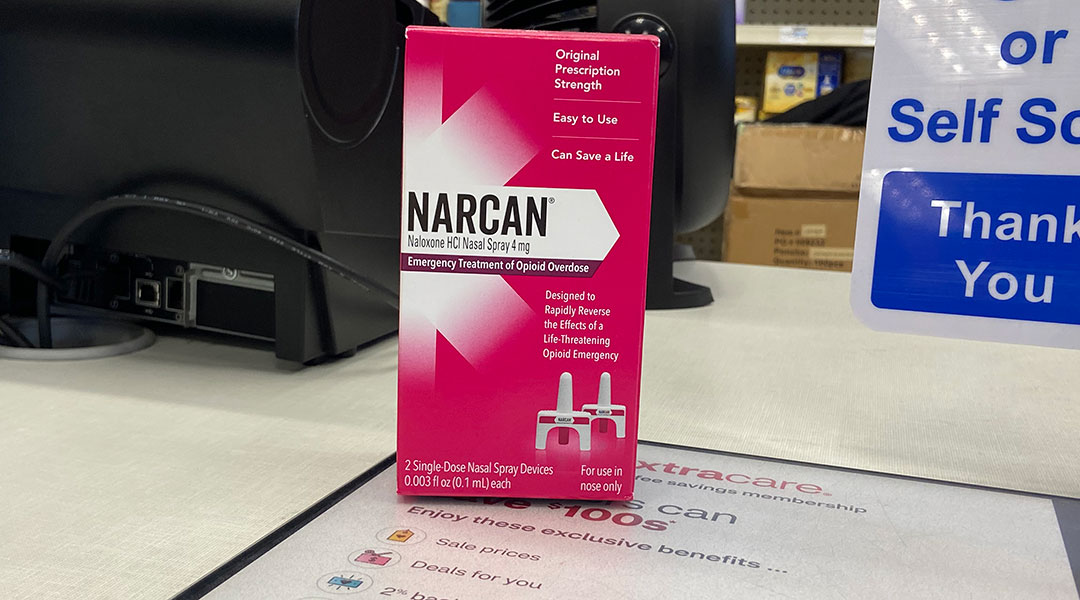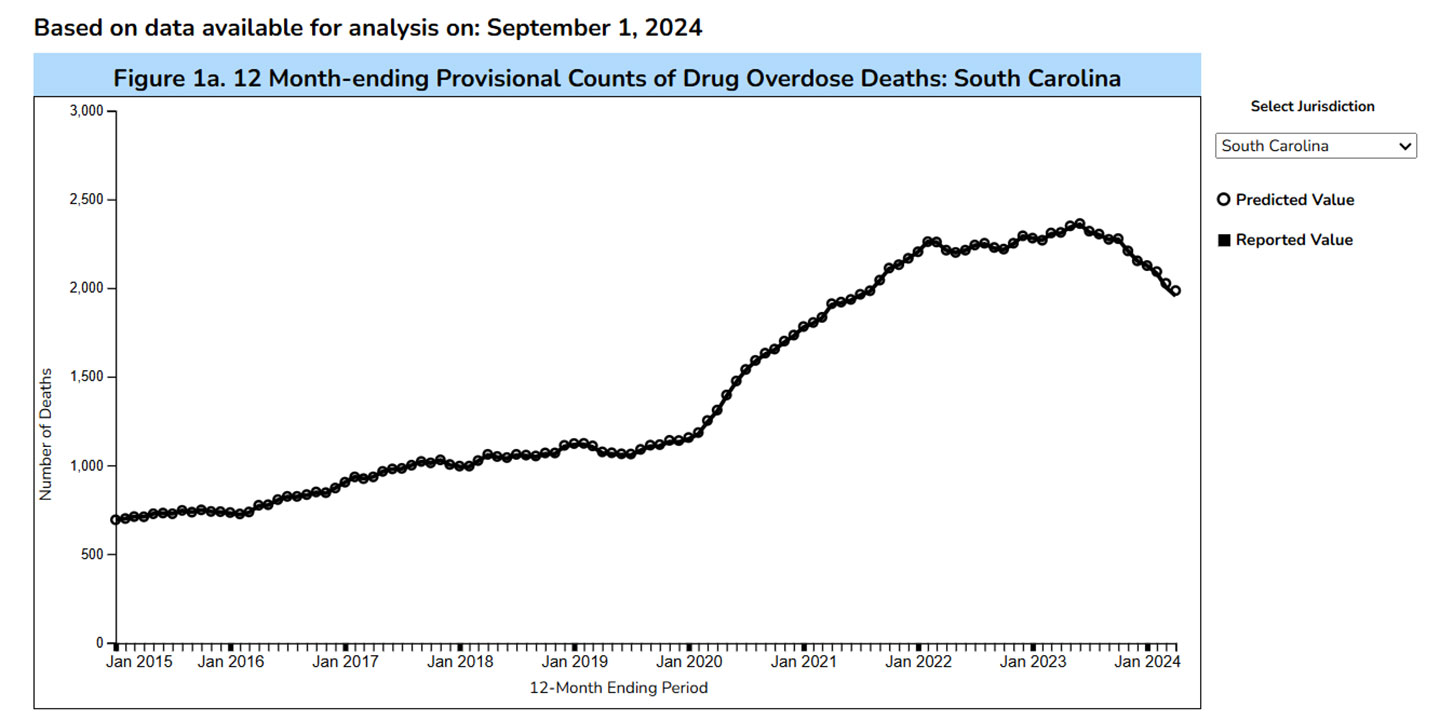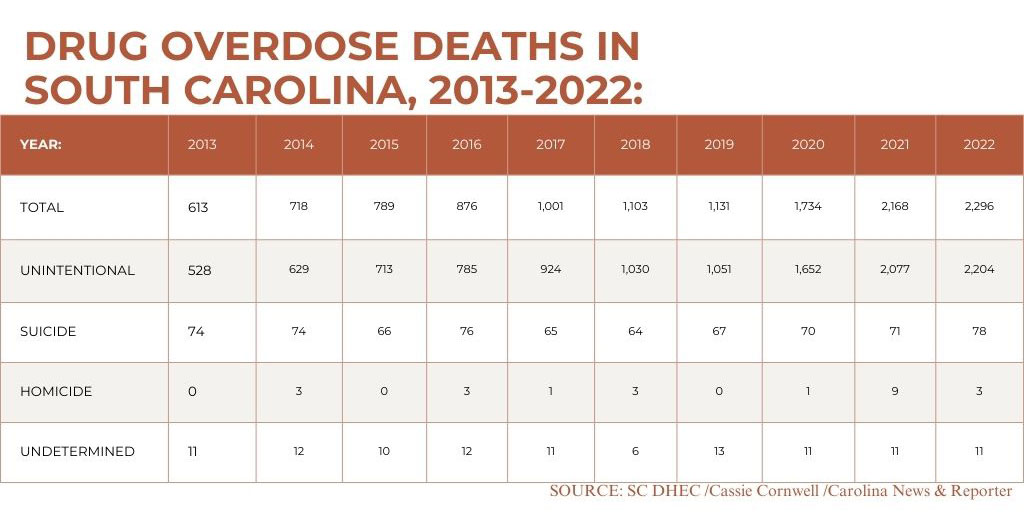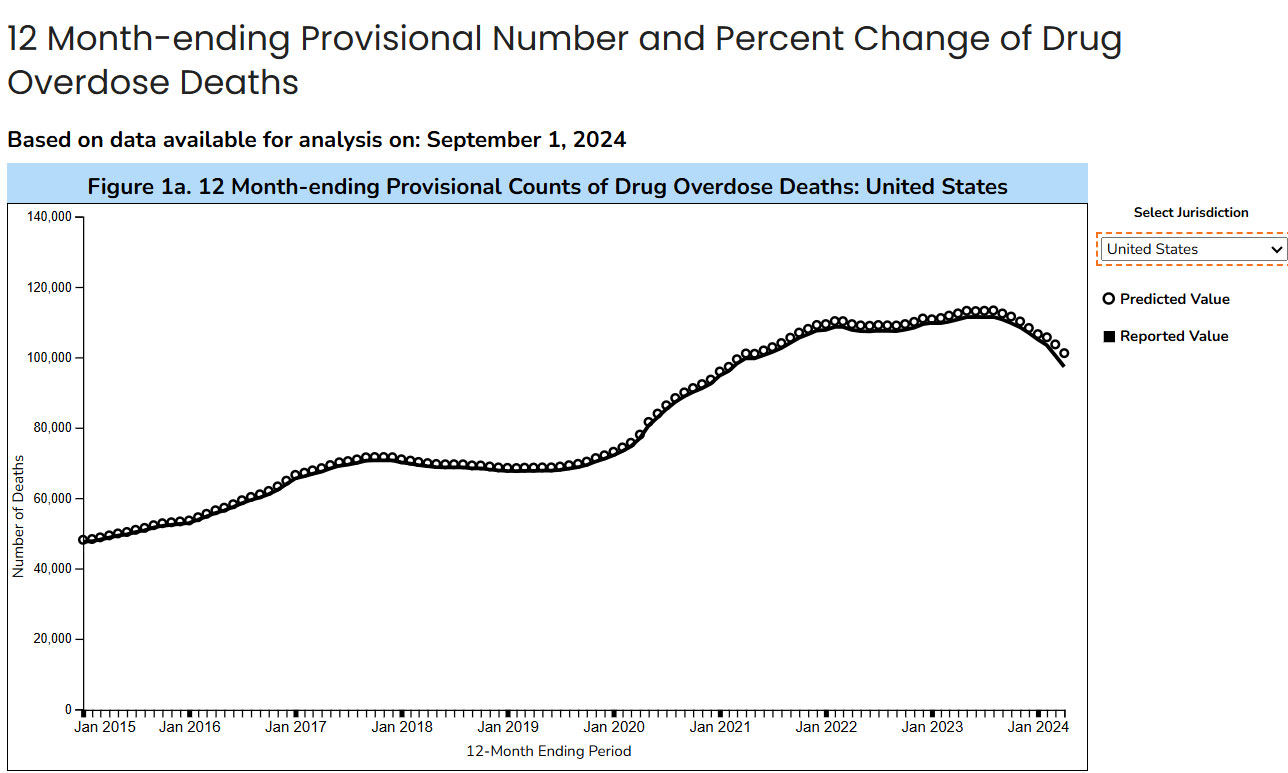NARCAN found on a shelf at a local CVS (Photo by Cassie Cornwell/Carolina News & Reporter)
After years of rising drug overdose deaths in South Carolina, newly released data shows a hopeful change.
This comes as South Carolina has made more of an effort to increase availability and educate people about naloxone, an opioid overdose reversal drug. While an encouraging sign, local experts say a lot more work is needed.
“Now, they’re still high,” Dr. Kevin Walker, with Prisma Health in Greenville, said of the deaths. “It takes a while for things to evolve, and now we’re evolving in the better direction.”
South Carolina overdose deaths dropped 6% in 2023 compared with a year prior, according to provisional data from the Centers for Disease Control and Prevention.
The CDC data dates to 1999, when there were 147 recorded overdose deaths; deaths climbed to 701 in 2014 before hitting an all-time high of 2,279 in 2022.
A change came in the past year, when 1,955 people died from May 1, 2023, to April 30 of this year, a drop of 354 from the previous year.
Nationally, the numbers look much the same.
Overdose deaths from the same recent period were 97,309, a 13,469 decline after a steady increase in 2020, when lethal overdoses began their dramatic rise.
Painkillers of choice
Opioids, both prescription and street painkillers such as fentanyl, are the drivers.
Fentanyl is up to 50 times stronger than heroin and 100 times stronger than morphine causing it to be more deadly than other opioids.
Fentanyl is extremely potent and often added to other drugs “which makes drugs cheaper, more powerful, more addictive, and more dangerous,” according to the CDC.
The drop means users have realized the potency and adjusted their behavior, professionals say.
“We’re seeing a lot of safer or at least less dangerous use (of drugs),” said Angela Shoulders, a USC doctoral student researching substance use disorders and mental health treatment.
Shoulders said education and access to drug overdose reversal treatment is “a really important first step.”
South Carolina lawmakers passed a bill in 2021 that requires medical professionals to offer overdose reversal drugs when prescribing opioids under certain circumstances. Those include when a patient is at increased risk for overdose, when a heavy dosage is prescribed, or when opioids are prescribed in combination with certain other medications.
This spring, another bill brought higher penalties for dealing the drug. If sharpens the definition and penalties for trafficking. A first-time offender, for example, can get from seven to 25 years in prison or up to a $50,000 fine.
Overdose deaths are “still absolutely, unacceptably high,” Shoulders said.
But overdoses might still be high, she said. She fears the drop in deaths could make policymakers comfortable, causing them to spend less time, money and attention on the issue.
“I don’t think we’re necessarily seeing a decrease in usage overall, which is why, again, getting more people in treatment is the next step,” Shoulders said.
Hope for those addicted
Lucky Detty knows all too well about the dangers of opioid addiction and the long path to recovery.
“I destroyed my life,” Detty said. “My first wife divorced me. I’m still not in my oldest daughter’s life like I would like to be.”
A successful business, a house on a golf course and what Detty called “the American dream” faded as addiction took over his life.
Now, Detty spends his time helping other men recover from addictions through his Christian-based, residential Reconciliation Ministries in Columbia, where he’s the founder and lead pastor.
“Withdrawals from opioids are like death,” Detty said.
Detty said encouraging people to seek help is a challenge.
“One of the things that I’m very passionate about is removing the stigma that keeps people from seeking help,” he said.
Detty said he became hooked on pain medication after herniating a disc in his back and has been free of addiction since 2012.
The ministries he began in 2017 help men work to build character through a Christian program and make efforts to restore their lives, including seeking employment and restoring damaged relationships.
Chris Dial, a Lexington County resident, said he’s now on the right side of what had been a life of drug addiction. He said he’s been clean for six years and gives credit to God, his wife and other loved ones.
Dial said he was started taking meth in high school.
“There’s no drug addict out there that woke up one day and decided they were going to be a drug addict,” Dial said. “It happens over time. It starts small.”
Dial said he had been in and out of jail but turned his life over to Christ. He said that gave him the strength to recover; and a woman, who’s now his wife, gave him the desire to get clean.
Dial is married with two children and is running his business, Living Water Drain and Plumbing.
Sholders said the drop in deaths could be for many reasons, such as “an increase in access to Naloxone, and an increase of knowledge among people who use drugs.”
That same amount of time and energy still needs to be poured into getting education out to the public, Shoulders said. She said that’s the only way to get those numbers to stay down.
CDC numbers show a recent decrease in South Carolina overdose deaths. (Graphic provided by the Centers for Disease Control and Prevention/Carolina News & Reporter)
State overdose deaths from 2013-2022 show a decline.
Overdose deaths have dropped nationwide as well. (Graphic provided by the Centers for Disease Control and Prevention/Carolina News & Reporter)





